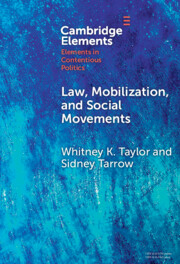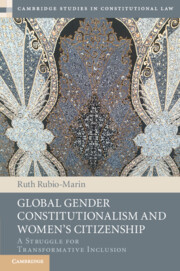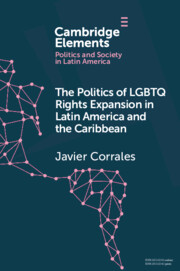42 results
Epilogue
-
- Book:
- Family Matters
- Published online:
- 27 May 2024
- Print publication:
- 31 July 2024, pp 267-273
-
- Chapter
- Export citation
7 - More Perfect Unions
- from Part III - Queer Families
-
- Book:
- Family Matters
- Published online:
- 27 May 2024
- Print publication:
- 31 July 2024, pp 231-266
-
- Chapter
- Export citation
The Cross-Regional Impact of Taiwan’s Same-Sex Marriage Legalisation: The Queer Economy of Welfare Mix
-
- Journal:
- Social Policy and Society , First View
- Published online by Cambridge University Press:
- 12 April 2024, pp. 1-16
-
- Article
-
- You have access
- Open access
- HTML
- Export citation
Contrasting Approaches to Managing the Debate on Same-Sex Blessing and Same-Sex Marriage in New Zealand and Australia: Applying Insights from Jungian Psychological Type Theory
-
- Journal:
- Journal of Anglican Studies , First View
- Published online by Cambridge University Press:
- 27 March 2024, pp. 1-22
-
- Article
-
- You have access
- Open access
- HTML
- Export citation

Law, Mobilization, and Social Movements
- How Many Masters?
-
- Published online:
- 06 March 2024
- Print publication:
- 28 March 2024
-
- Element
- Export citation
Legal entrepreneurship and the evolution of multidimensional advocacy in social movements: the case of marriage equality
-
- Journal:
- Law & Society Review / Volume 58 / Issue 1 / March 2024
- Published online by Cambridge University Press:
- 27 March 2024, pp. 95-125
- Print publication:
- March 2024
-
- Article
-
- You have access
- Open access
- HTML
- Export citation
Religion, Sexuality Politics, and the Transformation of Latin American Electorates
-
- Journal:
- British Journal of Political Science / Volume 54 / Issue 3 / July 2024
- Published online by Cambridge University Press:
- 04 December 2023, pp. 816-835
- Print publication:
- July 2024
-
- Article
-
- You have access
- Open access
- HTML
- Export citation
Taiwan's Same-Sex Marriage Legislation: Social Movement Strategies and Relational Dynamics
-
- Journal:
- Journal of East Asian Studies / Volume 23 / Issue 2 / July 2023
- Published online by Cambridge University Press:
- 27 March 2023, pp. 263-282
- Print publication:
- July 2023
-
- Article
-
- You have access
- Open access
- HTML
- Export citation
Legislators’ Religiosity and Same-Sex Marriage in Latin America
-
- Journal:
- Latin American Research Review / Volume 58 / Issue 3 / September 2023
- Published online by Cambridge University Press:
- 06 March 2023, pp. 539-560
-
- Article
-
- You have access
- Open access
- HTML
- Export citation
2 - Assessing and Exploring Judicial Fragmentation in International Human Rights Law
- from Part I - Introducing and Assessing Fragmentation and Convergence in International Human Rights Law
-
- Book:
- Judicial Convergence and Fragmentation in International Human Rights Law
- Published online:
- 22 December 2022
- Print publication:
- 05 January 2023, pp 42-94
-
- Chapter
- Export citation
5 - Toward a Constitutional Gender Erasure or a Constitutional Gender Reaffirmation?
-
- Book:
- Global Gender Constitutionalism and Women's Citizenship
- Published online:
- 29 September 2022
- Print publication:
- 06 October 2022, pp 274-328
-
- Chapter
- Export citation

Global Gender Constitutionalism and Women's Citizenship
- A Struggle for Transformative Inclusion
-
- Published online:
- 29 September 2022
- Print publication:
- 06 October 2022
14 - LGBTQ+ Rights
-
- Book:
- International Human Rights
- Published online:
- 11 August 2022
- Print publication:
- 11 August 2022, pp 494-540
-
- Chapter
- Export citation
A Court as a Means of Legislative Position Avoidance: Evidence from the Same-Sex Marriage Decision in Taiwan
-
- Journal:
- Asian Journal of Law and Society / Volume 10 / Issue 1 / February 2023
- Published online by Cambridge University Press:
- 11 May 2022, pp. 107-130
-
- Article
- Export citation

The Politics of LGBTQ Rights Expansion in Latin America and the Caribbean
-
- Published online:
- 22 December 2021
- Print publication:
- 07 April 2022
-
- Element
- Export citation
The Constitutionality of Diocesan Legislation Relating to Same-Sex Blessings and Marriage in the Anglican Church of Australia: A Case Note
-
- Journal:
- Ecclesiastical Law Journal / Volume 24 / Issue 2 / May 2022
- Published online by Cambridge University Press:
- 16 December 2021, pp. 209-232
- Print publication:
- May 2022
-
- Article
- Export citation
FROM BIGOTRY TO TOLERANCE - Who's the Bigot? Learning from Conflicts over Marriage and Civil Rights Law. By Linda C. McClain. Oxford: Oxford University Press, 2020. Pp. 304. $39.95 (cloth); $26.99 (digital). ISBN: 9780190877200.
-
- Journal:
- Journal of Law and Religion / Volume 36 / Issue 2 / August 2021
- Published online by Cambridge University Press:
- 26 August 2021, pp. 348-357
- Print publication:
- August 2021
-
- Article
- Export citation
18 - Christian Conscience and Sexual Expression Rights
- from Part III - Applied Topics in Law and Conscience
-
-
- Book:
- Christianity and the Laws of Conscience
- Published online:
- 12 June 2021
- Print publication:
- 24 June 2021, pp 354-374
-
- Chapter
- Export citation
21 - Religion, Conscience, and the Law
- from Part III - Applied Topics in Law and Conscience
-
-
- Book:
- Christianity and the Laws of Conscience
- Published online:
- 12 June 2021
- Print publication:
- 24 June 2021, pp 414-434
-
- Chapter
- Export citation
12 - Obeying God Rather Than Men
- from Part II - Conscience According to Major Figures and Traditions
-
-
- Book:
- Christianity and the Laws of Conscience
- Published online:
- 12 June 2021
- Print publication:
- 24 June 2021, pp 227-244
-
- Chapter
- Export citation



